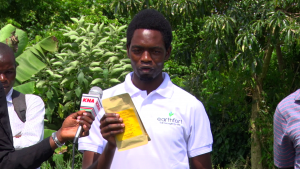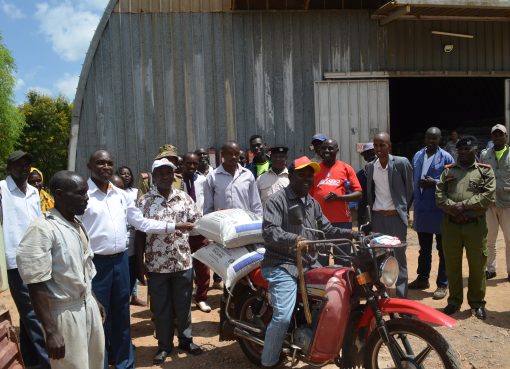Agriculture is one of the biggest sectors in the country, generating over 20 percent of Gross Domestic Product (GDP) and a major source of employment in both the formal and informal sectors in Kenya.
However, the raging debate on the use of inorganic and organic fertilizers has been one of the greatest contentious talks and a cause of concern among Kenyan farmers.
The large-scale farmers have continued to prefer the use of inorganic fertilizers, while their compatriots, the small-scale farmers, have heavily relied on organic fertilizers.
Even though the preference of usage between inorganic and organic fertilizers among small and large-scale farmers is wide, each has its own merits and limitations.
Large-scale farmers have always quoted the ‘labour intensive’ as one of the major reasons for inorganic fertilizer usage.
However, according to Migori County Kenya National Federation of Farmers (KEFFA) Chairperson, Peter Chacha, the labor-intensive, term used by large-scale farmers, is a scapegoat for the non-commitment to conserving the environment.
He notes that the use of inorganic fertilizer leads to quick yields, but farmers always focus on the advantage, forgetting that it increases the acidity of the soil, reduces soil fertility, and leads to the consumption of harmful chemicals by human beings.
Chacha, a farmer by profession, who cultivates more than 40 acres using organic fertilizer near the Kendege Technical, Training Institute (TTI) in Kuria East Sub-County, says that the usage of organic fertilizer can be by both large and small-scale farmers.
He believes that patience is what is lacking from the large-scale farmers in their daily productive work. Even though the labor-intensive term is used to describe a large amount of labour needed to produce goods and services with a high proportion of labour costs, Chacha notes that motivation and commitment to the usage of organic fertilizer, are what is required to save soil fertility and productivity.
“Initially I used to plant my crops using inorganic fertilizers that proved to be quite expensive and sometimes unavailable due to the huge demands,” affirmed Chacha during an exclusive interview with KNA recently.
The farmer who cultivates more than 10 different crops with a maturity period of between three to six months, says that organic fertilizer is quite cheap in the long run, as farming practices are a continuous venture.
He affirms that although the usage of organic fertilizer has a slower rate of crop maturity, the benefits are enormous.
Chacha acknowledges that organic fertilizer helps to treat soil fertility by rectifying soil PH and soil molecular structures.
He adds that the crops produced by organic fertilizers are healthy for human and animal consumption, and user friendly to the ecosystem, and soil conservation.
For a long time in the Kuria region, the cultivation of Tobacco exposed the soils to acidity from the chemicals and fertilizers that were used to grow the crop.
The World Health Organization’s (WHO) Framework Convention on Tobacco Control, addresses on environmental concerns, shows that tobacco crops deplete soil nutrients by taking up more nitrogen, phosphorus, and potassium, than other major crops.
Chacha stresses that it is important for the nation to adopt proper agricultural farming methods, to ensure prosperity and the success of healthy living is assured.
The KEFFA Official in collaboration with organizations such as Soil Fortify, Sidco, Earthforth, and Kenya Seed Company, has been engaging the surrounding community and students, by organising agricultural shows and demos at his Kendege farm, to teach the importance of utilising organic farming.

He has called upon the education stakeholders in the County to partner with environmentalists and farmers like him, to engage the Competence Based Curriculum (CBC) learners, to appreciate farm productivity, through organic fertilizer usage.
“I will continue to train the communities and learners on the importance of organic fertilizer, to promote healthy living through my kilimo biashara intiative”, says Chacha.
Earthforth Official, Thomas Ogalo, whose organisation deals with soil fertility, has urged farmers to normalize using organic fertilisers in their farms.
Ogalo who is also a soil scientist, disclosed recently that due to high market demand, the majority of farmers are fond of using inorganic fertilizers, because of their fast growth rate without considering its side effects.
He explained that Soil Fortify, whose active ingredient is 6.65 percent Humic Acids based derived from Leonardite on sweetcorn, is an organic fertilizer that can amend the soil and bring back the nutrients that were lost.
Ogalo added that organic fertilizers like soil fortify, are cost-saving because the farmer only applies once, with no need for top dressing.
The soil scientist also affirmed that Earthforth was in the process of implementing modern agriculture products tailored to help CBC learners appreciate, the farming sector in schools.
By Marion Obuya and Janemolly Achieng




